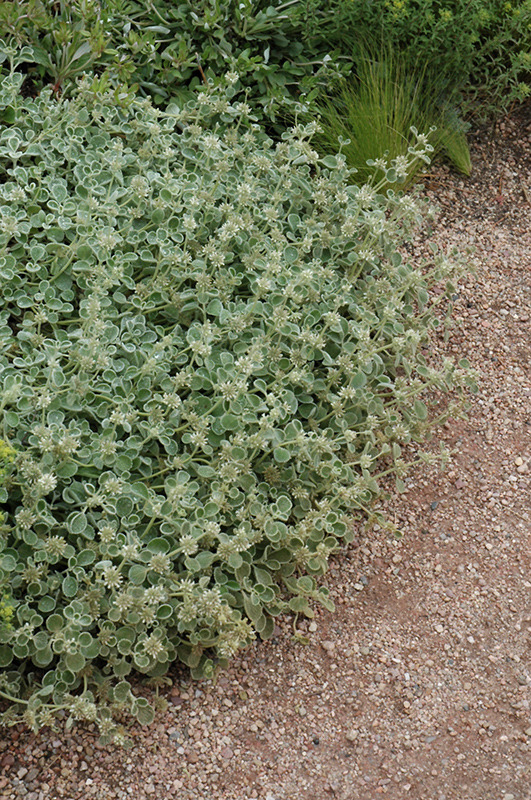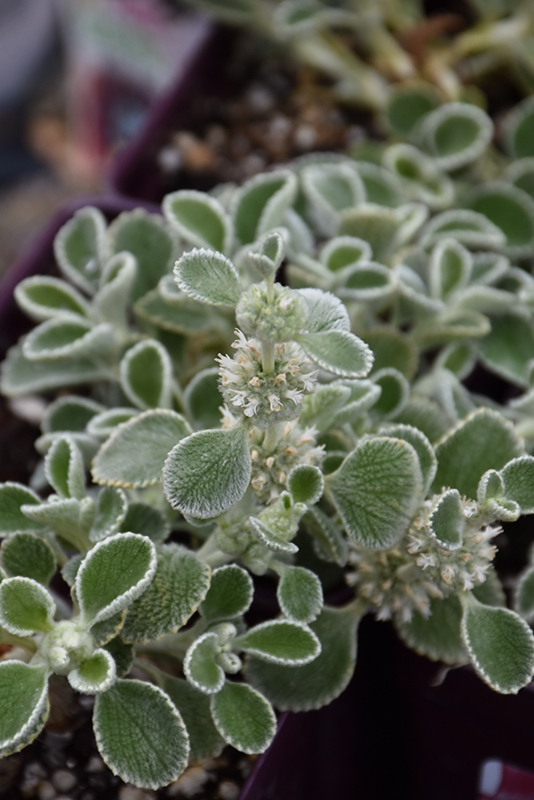Find Plants
Silver Edged Horehound*
Marrubium rotundifolium
* This is a "special order" plant - contact store for details
Plant Height: 6 inches
Flower Height: 8 inches
Spacing: 16 inches
Sunlight:
![]()
Hardiness Zone: 5
Other Names: Silverheels Horehound
Description:
A fuzzy, mat forming perennial groundcover, with round, woolly sage-green leaves with silvery white edges and undersides; does well in poor soils and dry sunny sites; does not like humid, hot conditions;
Ornamental Features
Silver Edged Horehound's attractive tomentose round leaves remain grayish green in color with distinctive silver edges and tinges of olive green throughout the season on a plant with a spreading habit of growth.
Landscape Attributes
Silver Edged Horehound is a dense herbaceous perennial with a ground-hugging habit of growth. Its relatively fine texture sets it apart from other garden plants with less refined foliage.
This is a relatively low maintenance plant. The flowers of this plant may actually detract from its ornamental features, so they can be removed as they appear. Gardeners should be aware of the following characteristic(s) that may warrant special consideration;
- Self-Seeding
Silver Edged Horehound is recommended for the following landscape applications;
- Mass Planting
- Rock/Alpine Gardens
- Border Edging
- Groundcover
- Container Planting
Planting & Growing
Silver Edged Horehound will grow to be only 6 inches tall at maturity extending to 8 inches tall with the flowers, with a spread of 20 inches. When grown in masses or used as a bedding plant, individual plants should be spaced approximately 16 inches apart. Its foliage tends to remain low and dense right to the ground. It grows at a medium rate, and under ideal conditions can be expected to live for approximately 10 years. As an herbaceous perennial, this plant will usually die back to the crown each winter, and will regrow from the base each spring. Be careful not to disturb the crown in late winter when it may not be readily seen!
This plant should only be grown in full sunlight. It prefers dry to average moisture levels with very well-drained soil, and will often die in standing water. It is considered to be drought-tolerant, and thus makes an ideal choice for a low-water garden or xeriscape application. It is particular about its soil conditions, with a strong preference for sandy, acidic soils. It is somewhat tolerant of urban pollution. This species is not originally from North America..
Silver Edged Horehound is a fine choice for the garden, but it is also a good selection for planting in outdoor pots and containers. Because of its spreading habit of growth, it is ideally suited for use as a 'spiller' in the 'spiller-thriller-filler' container combination; plant it near the edges where it can spill gracefully over the pot. Note that when growing plants in outdoor containers and baskets, they may require more frequent waterings than they would in the yard or garden.
* This is a "special order" plant - contact store for details
Disclaimer - This Plant Finder tool is an online resource representing many of the varieties that we carry over the course of the season, and is intended for informational purposes only. Inventory varies seasonally, so we cannot guarantee that every plant will be in stock at all times - please contact the store directly for availability. It does not include our entire inventory of plants, so be sure to visit our store to see varieties that may not be represented on this list.


